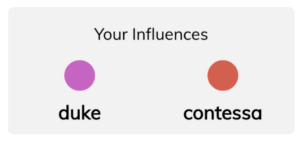
Coup is a board game (with online versions available) designed by Rikki Tahta and published by Indie Boards & Cards and La Mame Games. The game is designed for both friends and strangers, and both children and adults. Coup’s mechanics of Challenges and Influence cards effectively promote social deduction by encouraging players to engage in bluffing, risk-taking, and strategic alliances to win in an every-player-for-themselves game.
After a player declares an action, the other players have the ability to call their bluff and challenge it. Losing a challenge brings the player one step closer to losing the game. Thus, the mechanic of Challenges forces players to take calculated actions and strategically deceive others. Thus, these elements keep players returning to Coup to enjoy its competition and challenge, and to relish in the satisfaction of outsmarting their opponents.
One big draw for Coup is its short games taking as little as five to ten minutes unlike similar games like Masquerade. Quick games allow players to test out new strategies and immediately see the results of their actions. In the first few rounds, players often lack information to tell whether someone is bluffing or not. Thus, one effective strategy we learned is to deceive early to take advantage of the lack of information other players have. During one game, I lied about having the Captain on the first round, then told the truth about being the Contessa and Duke on the following rounds. My friend called my bluff, saying “You can’t be a Duke, Contessa, and Captain all at the same time you liar!”. However, because I was telling the truth this round, I won the challenge and successfully bluffed about having the Captain.

In contrast to team-based social deception games like Among Us or Secret Hitler, Coup is a zero-sum multilateral competition game. Winning or losing is straightforward: simply be the last player standing. However, the mechanics of assassinating or launching coups against other players can lead to the formation of alliances. For instance, my friend Michelle had been consistently exposed for bluffing in previous games, breaking trust in the group. Thus, the remaining players decided to work together to eliminate him. With two of us having Dukes, we made an agreement to allow the third player to take Foreign Aid and collect enough coins to eliminate Michelle on her next turn. While Coup is primarily an individual game, fun through fellowship can still be found with strategic cooperation being used to eliminate opponents.
Looking at Lazzaro’s 4 Keys 2 Fun, we see that Coup has “Hard Fun” with its challenges, strategies, and goal to eliminate all other players. Coup also has “People Fun” in its social nature, collaboration, and the chance to lie to and call out friends. However, according to Lazzaro, for Coup to be considered fun, it needs to contain at least three of the four keys to fun. Coup meets this criteria as it also has “Easy Fun”. The Influence cards add a level of fantasy, allowing players to immerse themselves in their characters and special abilities.
One clever decision by the designer was to include three copies of each Influence card. When playing in groups larger than three people, keeping track of how many players claim to have each Influence can help in deducing who is bluffing. During one round with four players, all of us claimed to be the Duke. However, knowing that there are only three copies of each Influence, we realized that at least one player was lying. Given that Lauren was the last player to claim to be Duke, she was challenged. However, it was revealed that Lauren did have the Duke and she won the challenge. Thus, small clues such as the number of cards and repeated copies in the deck can help players deceive others.
The strategic choice of all players claiming to be Duke highlighted a flaw: there is an imbalance of power among Influence cards. In every round, at least one player would bluff as the Duke, as the ability to take three coins was significantly more powerful than the alternative of one coin. In contrast, the Ambassador was a weaker role. In the three games my friends and I played, the Ambassador was only mentioned once. Thus, one possible solution would be to introduce additional powers to weaker cards, such as allowing the Ambassador to swap cards from other players. In addition, reducing the number of powerful cards, such as including two Dukes rather than three, would force players to choose wisely when to bluff as the likelihood of being challenged has increased. Finally, introducing new Influence cards and powers could motivate players to explore different strategies.
Nicole Lazzaro’s 4 Keys to Fun https://www.nicolelazzaro.com/the4-keys-to-fun/


